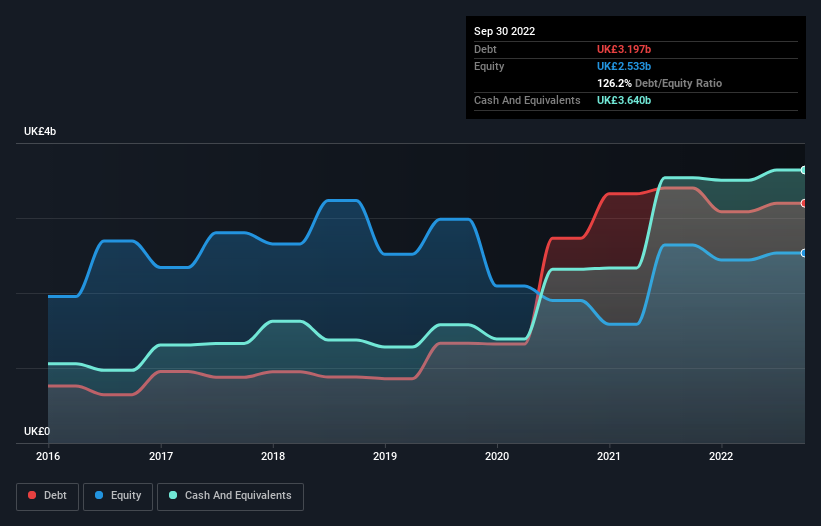The external fund manager backed by Berkshire Hathaway's Charlie Munger, Li Lu, makes no bones about it when he says 'The biggest investment risk is not the volatility of prices, but whether you will suffer a permanent loss of capital.' When we think about how risky a company is, we always like to look at its use of debt, since debt overload can lead to ruin. As with many other companies easyJet plc (LON:EZJ) makes use of debt. But is this debt a concern to shareholders?
When Is Debt Dangerous?
Debt assists a business until the business has trouble paying it off, either with new capital or with free cash flow. Ultimately, if the company can't fulfill its legal obligations to repay debt, shareholders could walk away with nothing. While that is not too common, we often do see indebted companies permanently diluting shareholders because lenders force them to raise capital at a distressed price. By replacing dilution, though, debt can be an extremely good tool for businesses that need capital to invest in growth at high rates of return. The first step when considering a company's debt levels is to consider its cash and debt together.
Check out our latest analysis for easyJet
What Is easyJet's Debt?
As you can see below, easyJet had UK£3.20b of debt at September 2022, down from UK£3.40b a year prior. However, it does have UK£3.64b in cash offsetting this, leading to net cash of UK£443.0m.

How Strong Is easyJet's Balance Sheet?
According to the last reported balance sheet, easyJet had liabilities of UK£3.68b due within 12 months, and liabilities of UK£4.24b due beyond 12 months. Offsetting these obligations, it had cash of UK£3.64b as well as receivables valued at UK£243.0m due within 12 months. So it has liabilities totalling UK£4.04b more than its cash and near-term receivables, combined.
The deficiency here weighs heavily on the UK£2.51b company itself, as if a child were struggling under the weight of an enormous back-pack full of books, his sports gear, and a trumpet. So we definitely think shareholders need to watch this one closely. At the end of the day, easyJet would probably need a major re-capitalization if its creditors were to demand repayment. easyJet boasts net cash, so it's fair to say it does not have a heavy debt load, even if it does have very significant liabilities, in total. When analysing debt levels, the balance sheet is the obvious place to start. But it is future earnings, more than anything, that will determine easyJet's ability to maintain a healthy balance sheet going forward. So if you're focused on the future you can check out this free report showing analyst profit forecasts.
In the last year easyJet wasn't profitable at an EBIT level, but managed to grow its revenue by 296%, to UK£5.8b. When it comes to revenue growth, that's like nailing the game winning 3-pointer!
So How Risky Is easyJet?
While easyJet lost money on an earnings before interest and tax (EBIT) level, it actually generated positive free cash flow UK£246m. So taking that on face value, and considering the net cash situation, we don't think that the stock is too risky in the near term. One positive was the revenue growth of 296% over the last year. But the stock still looks risky to us. When I consider a company to be a bit risky, I think it is responsible to check out whether insiders have been reporting any share sales. Luckily, you can click here ito see our graphic depicting easyJet insider transactions.
Of course, if you're the type of investor who prefers buying stocks without the burden of debt, then don't hesitate to discover our exclusive list of net cash growth stocks, today.
New: Manage All Your Stock Portfolios in One Place
We've created the ultimate portfolio companion for stock investors, and it's free.
• Connect an unlimited number of Portfolios and see your total in one currency
• Be alerted to new Warning Signs or Risks via email or mobile
• Track the Fair Value of your stocks
Have feedback on this article? Concerned about the content? Get in touch with us directly. Alternatively, email editorial-team (at) simplywallst.com.
This article by Simply Wall St is general in nature. We provide commentary based on historical data and analyst forecasts only using an unbiased methodology and our articles are not intended to be financial advice. It does not constitute a recommendation to buy or sell any stock, and does not take account of your objectives, or your financial situation. We aim to bring you long-term focused analysis driven by fundamental data. Note that our analysis may not factor in the latest price-sensitive company announcements or qualitative material. Simply Wall St has no position in any stocks mentioned.
About LSE:EZJ
Adequate balance sheet and fair value.
Similar Companies
Market Insights
Community Narratives



